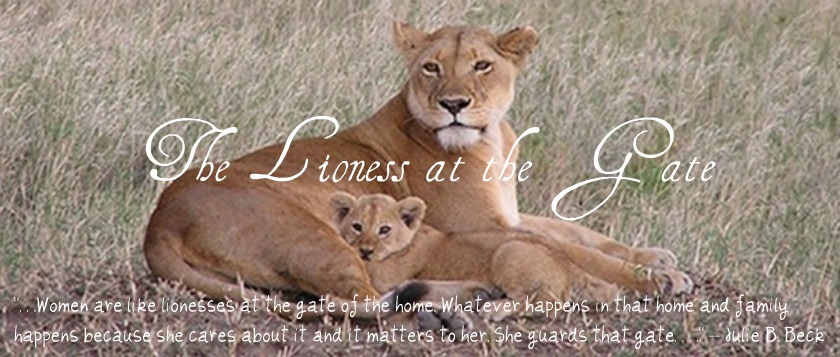On womanhood & motherhood:
I believe that the divinity of womanhood is expressly linked to motherhood. . . .
For a little while, in the past year or so, I started getting a little sympathetic towards Mormon feminists. Not, "They are right" but "I don't understand them, and I want to understand them" sympathetic. I started talking to a lot of different people with different ideas, etc, and I found myself slowly starting to wonder if motherhood really was the definition of womanhood. 2-3 years ago I would have said "Asbolutely", a year ago I would have said, "I'm not 100% sure", but now I am back to "Absolutely."
I was called to be an assistant primary chorister back in April, and the song they are learning this year is called The Family is of God, and at first I was unsure of the words (they basically say the same thing as the Proclamation") but as I have taught those words to the primary I have gained a sure testimony that they are true. Absolutely true. The Proclamation to the World is true. Every word of it. Every single word. I don't think that it was written erroneously, I don't think that it matters that it was written entirely by men - because I don't believe that it was written by "men" - it was written by prophets of God who receive revelation for our day....
On why we can't always have it the way we want it:
I also believe that this life is imperfect, our bodies are imperfect, and life just sucks sometimes. That is the way this mortal probation is meant to be.
When Adam and Eve were in the garden, Heavenly Father gave them two commandments that seemed to be conflicting - multiply and replenish the earth, but don't eat the fruit of the tree of knowledge of good and evil. I feel like He gives us similar commandments today (what? You mean God is the same yesterday, today, and forever?!). The commandment to multiply and replenish the earth is still in full force, but we must, as Adam and Eve, in a way partake of the fruit of the tree of knowledge of good and evil, and live a corrupted mortal existence. Basically God is commanding us to do something that WE HAVE NO POWER TO GUARANTEE. We cannot guarantee that we will be able to have children, yet to bear children IS a commandment. And I think that God doesn't withhold marriage and offspring [as a punishment?] from His children. That would be nonsense. Rather, the condition of our mortality at times prevents us from doing what God wants us to do.
Those who ARE able to multiply and replenish the earth should not feel that they are somehow better, or more blessed than those who cannot. We are blessed in different ways....
On working moms, feminism, family priorities, and roles:
I have done both the SAHM thing and the workplace thing, and I have to say I feel like people respect me 100 times more as a working mom than they did as a SAHM. I don't care one whit what other people think of me, so my point isn't to point out how hurt I was (because I wasn't - I honestly didn't care. I do what I feel is right for my family and no one besides me and my husband and maybe my bishop and parents - at times - could possibly have any insight into what is right for MY family) but my point IS to show that SAHMs DO seem to be less respected. [I thought this was really interesting to hear Becca say this as she's lived both the SAHM life and the working mom life. Personally, as a SAHM, I don't think I'm in too many situations to be able to notice any lack of respect, but I find her dual-perspective fascinating.]
I have not felt that feminism says "equality of opportunity" but rather says "women who put children above education and career goals have their priorities screwed up and are damaging opportunities for women everywhere". As a math teacher I definitely feel that. We are no longer pressuring our daughters to grow up to be good mothers, we are pressuring them to grow up and go to school for 6-7 years to chase the corporate ladder, or to work long hours as an engineer, or otherwise chase goals and dreams OUTSIDE the home. And those goals are fine. As long as they come second to raising children (for MEN as well as women - my husband is a fantastic provider, but his #1 career goal is to be able to provide for his family without having to spend a lot of TIME away from his family - something I admire very much in him).
I want to encourage my daughters to get an education - my parents encouraged both me and my sister. I have a degree in math and physics and I am working on a Masters of Education, with a goal to pursue a PhD in education. My sister has a degree in clinical lab science and has plans to go back to school to become a pathologist.
HOWEVER, for BOTH of us, our #1 priority is having babies and raising them. The education and career paths we want to pursue come SECOND.
Which means our earning potential will never be as great as a man who's #1 priority is probably providing for a family. But that's okay, because neither of us have "providing for a family" as a priority. I'm cool with that.
I am NOT cool with a woman who does as much (or more) work as(than) a man having less earning potential or respect or advancement opportunity simply because she is a woman. I believe that is absolutely ridiculous. . . . And I don't agree with it, and it's absolutely abhorrent.
While I do believe that bearing and raising children should be a woman's (and a man's) #1 priority in life, I DO believe that women who don't have that opportunity should not be punished by our society for it.Thanks Becca for your "guest post." Ha.








.jpg)
